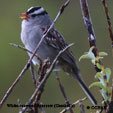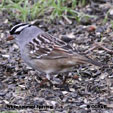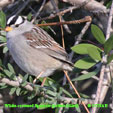North American Bird Search Box
This search box can be used to find bird species using bird's english, french or latin name, or to identify bird by its 4 letter Alpha Code
Field Guide for all the Birds of North America
White-crowned Sparrow
4 Letter (english names) Alpha Code: WCSP (1)
Bruant à couronne blanche
Zonotrichia leucophrys
Information, images and range maps on over 1,000 birds of North America, including sub-species, vagrants, introduced birds and possibilities
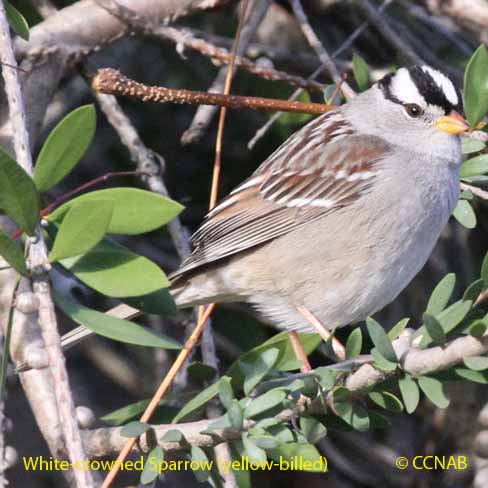
There are a variety of sub-species in the White-crowned Sparrow family seen in North America. Of these, there are three recognizable sub-species to name a few. These being the White-crowned Sparrow (taiga) which is the most common among the group. It is mostly seen in its spring and fall migrations, on its journey into and from the northern areas of North America. The White-crowned Sparrow (Gambel's) is found in the far northwestern parts of the continent and seen again, only during its spring and fall migrations. The White-crowned Sparrow (yellow-billed) migrates the least and is seen along the western coast, from southern British Columbia to the southern regions of California.
North American Birds Videos
- Click here - Juvenile
- Click here - Adult
North American Bird Calls
- Click here
- Summer
- Year Around
- Winter
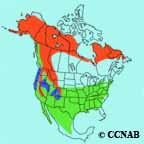
The White-crowned Sparrow is one of the largest members of the sparrow group. It is a ground feeder, preferring stunted growths to nest in. It is one of the few sparrow types that do show up at ground feeders to stock up on seeds, for their travels. The juveniles of this bird species do not display the bold white stripes seen by their parents, but have a dull brownish-orange stripe instead.
Reference to Other Bird Site:
ABA - American Birding Association This site represents an organization that maintains official records of all birds species that have been proven to have been seen inside the perimeters of the North American Continent and the surrounding bodies of water. Regular revised versions are posted to keep the bird list current at all times. This is the list used by all serious birders over their lifetime. You may be aware of the movie called the "Big Year". It was with this list that all the competing birders used in an attempt to set a new record as to how many bird species that could be seen by an individual birder in one calendar year.
